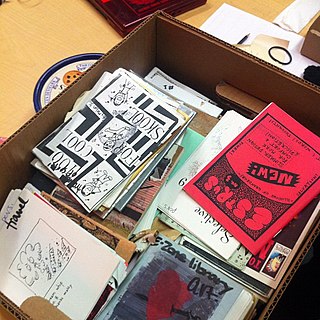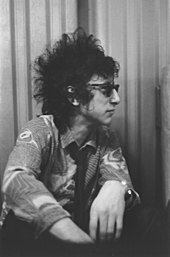
Cyberpunk is a subgenre of science fiction in a dystopian futuristic setting that tends to focus on a "combination of lowlife and high tech", featuring futuristic technological and scientific achievements, such as artificial intelligence and cyberware, juxtaposed with societal collapse, dystopia or decay. Much of cyberpunk is rooted in the New Wave science fiction movement of the 1960s and 1970s, when writers like Philip K. Dick, Michael Moorcock, Roger Zelazny, John Brunner, J. G. Ballard, Philip José Farmer and Harlan Ellison examined the impact of drug culture, technology, and the sexual revolution while avoiding the utopian tendencies of earlier science fiction.

Goth is a music-based subculture that began in the United Kingdom during the early 1980s. It was developed by fans of gothic rock, an offshoot of the post-punk music genre. Post-punk artists who presaged the gothic rock genre and helped develop and shape the subculture include Siouxsie and the Banshees, Bauhaus, the Cure, and Joy Division.

The punk subculture includes a diverse and widely known array of ideologies, fashion, and other forms of expression, visual art, dance, literature, and film. Largely characterised by anti-establishment views, the promotion of individual freedom, and the DIY ethics, the culture originated from punk rock.

Stuckism is an international art movement founded in 1999 by Billy Childish and Charles Thomson to promote figurative painting as opposed to conceptual art. By May 2017 the initial group of 13 British artists had expanded to 236 groups in 52 countries.

A zine is a small-circulation self-published work of original or appropriated texts and images, usually reproduced via a copy machine. Zines are the product of either a single person or of a very small group, and are popularly photocopied into physical prints for circulation. A fanzine is a non-professional and non-official publication produced by enthusiasts of a particular cultural phenomenon for the pleasure of others who share their interest. The term was coined in an October 1940 science fiction fanzine by Russ Chauvenet and popularized within science fiction fandom, entering the Oxford English Dictionary in 1949.

Billy Childish is an English painter, author, poet, photographer, film maker, singer and guitarist. Since the late 1970s, Childish has been prolific in creating music, writing and visual art. He has led and played in bands including the Pop Rivets, Thee Milkshakes, Thee Headcoats, and the Musicians of the British Empire, primarily working in the genres of garage rock, punk and surf and releasing more than 100 albums.

A punk zine is a zine related to the punk subculture and hardcore punk music genre. Often primitively or casually produced, they feature punk literature, such as social commentary, punk poetry, news, gossip, music reviews and articles about punk rock bands or regional punk scenes.

Phillip Christopher Jupitus is a retired English stand-up and improv comedian, actor, performance poet, cartoonist and podcaster. Jupitus was a team captain on all but one BBC Two-broadcast episode of music quiz Never Mind the Buzzcocks from its inception in 1996 until 2015, and also appears regularly as a guest on several other panel shows, including QI and BBC Radio 4's I'm Sorry I Haven't a Clue.

John Baine, better known by his stage name Attila the Stockbroker, is an English punk poet, multi instrumentalist musician and songwriter. He performs solo and as the leader of the band Barnstormer 1649, who combine early music and punk. He has performed over 3,800 concerts, published eight books of poems, an autobiography and in 2021 his Collected Works spanning 40 years. He has released over forty recordings.

Charles Thomson is an English artist, poet and photographer. In the early 1980s he was a member of The Medway Poets. In 1999 he named and co-founded the Stuckists art movement with Billy Childish. He has curated Stuckist shows, organised demonstrations against the Turner Prize, run an art gallery, stood for parliament and reported Charles Saatchi to the OFT. He is frequently quoted in the media as an opponent of conceptual art. He was briefly married to artist Stella Vine.
Since the advent of the cyberpunk genre, a number of cyberpunk derivatives have become recognized in their own right as distinct subgenres in speculative fiction, especially in science fiction. Rather than necessarily sharing the digitally and mechanically focused setting of cyberpunk, these derivatives can display other futuristic, or even retrofuturistic, qualities that are drawn from or analogous to cyberpunk: a world built on one particular technology that is extrapolated to a highly sophisticated level, a gritty transreal urban style, or a particular approach to social themes.

The Medway Poets were founded in Medway, Kent, in 1979. They were an English punk based poetry performance group and later formed the core of the first Stuckists Art Group. The members were Miriam Carney, Billy Childish, Robert Earl, Bill Lewis, Sexton Ming, Charles Thomson and Alan Denman. Others associated with the group include Philip Absolon, Sanchia Lewis and Tracey Emin. Most members also practised other art forms including music and painting.

William Lewis is an English artist, story-teller, poet and mythographer. He was a founder-member of The Medway Poets and of the Stuckists art group.
Steven Wells was a British journalist, author, comedian and punk poet born in Swindon, Wiltshire. He was best known for ranting poetry and his provocative, unapologetic music journalism. In June 2006, he wrote in the Philadelphia Weekly about his treatment for Hodgkin's lymphoma. After being in remission for a short time, he was diagnosed with enteropathy-associated T-cell lymphoma in January 2009 and died on 24 June 2009 in Philadelphia.
Aaron Elliott, better known as Aaron Cometbus, is an American musician, author, songwriter, roadie, and magazine editor, best known as the creator of the punk zine Cometbus.

The Square was a 250 capacity independent live music venue in Harlow, Essex, England. It was managed by SquareOne Entertainment LLP who took over the venue in July 2008. After a five-month closure period from the end of 2015, The Square re-opened on Friday, 10 June 2016 before closing permanently in early 2017.

Tech-noir is a hybrid genre of fiction, particularly film, combining film noir and science fiction, epitomized by Ridley Scott's Blade Runner (1982) and James Cameron's The Terminator (1984). The tech-noir presents "technology as a destructive and dystopian force that threatens every aspect of our reality".
Japanese cyberpunk refers to cyberpunk fiction produced in Japan. There are two distinct subgenres of Japanese cyberpunk: live-action Japanese cyberpunk films, and cyberpunk manga and anime works.

Dieselpunk is a retrofuturistic subgenre of science fiction similar to steampunk or cyberpunk that combines the aesthetics of the diesel-based technology of the interwar period through to the 1950s with retro-futuristic technology and postmodern sensibilities. Coined in 2001 by game designer Lewis Pollak to describe his tabletop role-playing game Children of the Sun, the term has since been applied to a variety of visual art, music, motion pictures, fiction, and engineering.

















